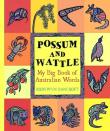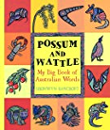AustLit
Latest Issues
AbstractHistoryArchive Description
'Possum and Wattle is a lavishly illustrated word book of Australia. With over 100 words about Australian animals, plants and landscapes and aimed specifically at children, this book is definitively the first of its kind. Words include blossoms and bees through to wombats and willy willys. The pages range from neatly vignetted illustrations to large narrative landscapes. The book is designed to intrigue, captivate and nurture inquisitive minds and to celebrate the uniqueness of Australia and its words.' (Publication summary)
Publication Details of Only Known VersionEarliest 2 Known Versions of
Works about this Work
-
The Case of Children's Literature : Colonial or Anti-Colonial?
2011
single work
criticism
— Appears in: Global Studies of Childhood , vol. 1 no. 4 2011; (p. 271-279)'Since Jacqueline Rose published The Case of Peter Pan in 1984, scholars in the field of children's literature have taken up a rhetorical stance which treats child readers as colonised, and children's books as a colonising site. This article takes issue with Rose's rhetoric of colonisation and its deployment by scholars, arguing that it is tainted by logical and ethical flaws. Rather, children's literature can be a site of decolonisation which revisions the hierarchies of value promoted through colonisation and its aftermath by adopting what Bill Ashcroft refers to as tactics of interpolation. To illustrate how decolonising strategies work in children's texts, the article considers several alphabet books by Indigenous author-illustrators from Canada and Australia, arguing that these texts for very young children interpolate colonial discourses by valorising minority languages and by attributing to English words meanings produced within Indigenous cultures.' (Source: Author's abstract)
-
Kids' World Through Aboriginal Eyes
2009
single work
column
— Appears in: The Advertiser , 7 October 2009; (p. 25) -
Untitled
2009
single work
review
— Appears in: Reading Time : The Journal of The Children's Book Council of Australia , February vol. 53 no. 1 2009; (p. 22)
— Review of Possum and Wattle : My First Big Book of Australian Words 2008 single work picture book -
[Untitled]
2008
single work
review
— Appears in: Magpies : Talking About Books for Children , November vol. 23 no. 5 2008; (p. 27)
— Review of Possum and Wattle : My First Big Book of Australian Words 2008 single work picture book -
Under Age
2008
single work
review
— Appears in: The Sunday Age , 19 October 2008; (p. 27)
— Review of The Wish Pony 2008 single work children's fiction ; Possum and Wattle : My First Big Book of Australian Words 2008 single work picture book
-
Under Age
2008
single work
review
— Appears in: The Sunday Age , 19 October 2008; (p. 27)
— Review of The Wish Pony 2008 single work children's fiction ; Possum and Wattle : My First Big Book of Australian Words 2008 single work picture book -
[Untitled]
2008
single work
review
— Appears in: Magpies : Talking About Books for Children , November vol. 23 no. 5 2008; (p. 27)
— Review of Possum and Wattle : My First Big Book of Australian Words 2008 single work picture book -
Untitled
2009
single work
review
— Appears in: Reading Time : The Journal of The Children's Book Council of Australia , February vol. 53 no. 1 2009; (p. 22)
— Review of Possum and Wattle : My First Big Book of Australian Words 2008 single work picture book -
Kids' World Through Aboriginal Eyes
2009
single work
column
— Appears in: The Advertiser , 7 October 2009; (p. 25) -
The Case of Children's Literature : Colonial or Anti-Colonial?
2011
single work
criticism
— Appears in: Global Studies of Childhood , vol. 1 no. 4 2011; (p. 271-279)'Since Jacqueline Rose published The Case of Peter Pan in 1984, scholars in the field of children's literature have taken up a rhetorical stance which treats child readers as colonised, and children's books as a colonising site. This article takes issue with Rose's rhetoric of colonisation and its deployment by scholars, arguing that it is tainted by logical and ethical flaws. Rather, children's literature can be a site of decolonisation which revisions the hierarchies of value promoted through colonisation and its aftermath by adopting what Bill Ashcroft refers to as tactics of interpolation. To illustrate how decolonising strategies work in children's texts, the article considers several alphabet books by Indigenous author-illustrators from Canada and Australia, arguing that these texts for very young children interpolate colonial discourses by valorising minority languages and by attributing to English words meanings produced within Indigenous cultures.' (Source: Author's abstract)






